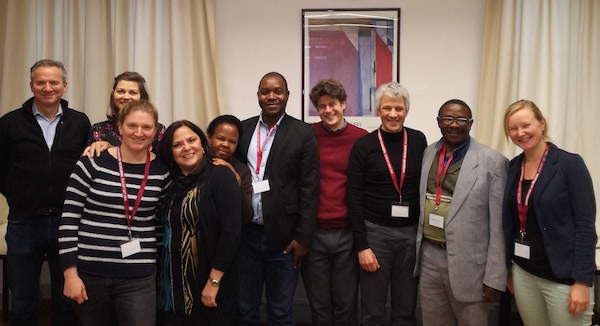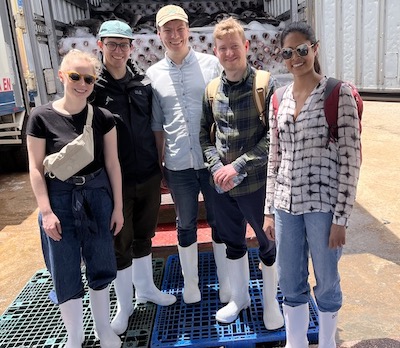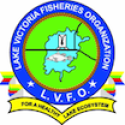The MultiTip Team
Our interdisciplinary team consists of researchers from Heidelberg University and University of Kassel, local partner organizations from LVFO, TAFIRI, NaFIRRI, KMFRI and a scientific advisory board.

Our researchers, partners and advisory board members discussed the components of MultiTip.
Team Members
Past Team Members
Partners from Lake Victoria
Scientific Advisory Board
Team Members
Our interdisciplinary research team consists of social scientists, natural scientists and computational natural scientists from Heidelberg University and University of Kassel.

 |
Timo Goeschl is a Professor of Environmental Economics at the Alfred-Weber Institute of Economics, University of Heidelberg. He is a renowned expert in both theoretical and experimental research on the dynamics of economics in complex environments. He is also director of the Research Center on Environmental Economics, board member of the Heidelberg Center for the Environment and serves as a co-editor of Environmental and Resource Economics, on the Editorial Board of the Journal of Environmental Economics and Management and Economics of Disasters and Climate Change. |
||
 |
Astrid Dannenberg is a Professor of Environmental and Behavioral Economics at the Institute of Economics, University of Kassel. She is is widely recognised as a leading expert in experimental environmental economics. She heads the Department of Environmental and Behavioral Economics and is responsible for the Master's degree program Sustainable Economics. Astrid Dannenberg has been awarded the Starting Grant by the European Research Council, was a council member of the European Association of Environmental and Resource Economists (2016-2019) and is Associate Editor at Economic Inquiry and Co-Editor at Environmental and Resource Economics. |
||
|
|
Anna Marciniak-Czochra is a Professor at the Institute of Applied Mathematics at Heidelberg University. She is an expert in mathematical modelling for bio-science research. She is director of the Institute of Applied Mathematics at Heidelberg University and the leader of a research group on Applied Analysis and Modelling in Biosciences. From 2017-2021, she was awarded a research grant by the Collaborative Research Center (funded by the German Research Council) and previously, Anna Marciniak-Czochra was coordinator for the Research Training Group on "Mathematical Modeling for the Quantitative Biosciences". |
||
| Prof. Dr. Florian Diekert | |||
|
|
Florian Diekert is a Professor of Environmental Economics at University of Augsburg. He is an expert on renewable resource systems and common-pool resource management. He was awarded the Starting Grant by the European Research Council and has published several interdisciplinary studies on fisheries.
|
||
 |
Karlijn van den Broek is a Postdoctoral Researcher in Environmental and Cognitive Psychology at the University of Heidelberg. She is also part of a select team that is trained at the Postdoc Academy for Transformational Leadership, funded by the Robert-Bosch-Stiftung. Her research looks at the cognitive processes that influence decision-making and environmental behaviour, focusing on heuristics and mental models. In MultiTip, she investigates mental models among Lake Victoria stakeholders and has developed the M-Tool, a software for capturing mental models. This is the first tool that offers a standardized approach that does not require participants literacy for eliciting mental models. |
||
Santiago Gómez-Cardona is a lecturer at University College Maastricht (UCM) Maastricht University (UM), the Netherlands. He has a doctorate in economics with a background in anthropology at the undergraduate and master levels. He is interested in research on renewable resource extraction and transportation in developing contexts. In MultiTip, he studies the mechanisms that could be implemented to sustainably manage open access fisheries in Lake Victoria. |
|||
 |
Tillmann Eymess is a Postdoctoral Researcher at the Research Center for Environmental Economics, Heidelberg University. His research uses experimental methods to study how environmental pollution crises interact with social inequality. With regards to MultiTip, his research focuses on new regulatory instruments for the use of common pool resources under weak enforcement. |
||
|
|
Philipp Händel is a Ph.D. candidate at the department of Environmental and Behavioral Economics at the University of Kassel. His work in MultiTip focuses on how institutions and the social environment influence risk-taking and cooperative behavior of resource users such as fishers at Lake Victoria. |
||
 |
Johannes Kammerer is a Postdoctoral Researcher at the Institute for Mathematics at Heidelberg University. In the MultiTip project, he investigates the interplay between the fish stock and fishery regulations using a size structured model of the Nile perch fishery. |
||
 |
Sorell de Silva is Science Communication Officer for MultiTip at the Research Center of Environmental Economics (RCEE), Heidelberg University. She is also a Ph.D. candidate at the Department of Environmental Economics, Alfred-weber Institute of Economics, University of Heidelberg. She is interested in studying tools that can be used for fisheries management and wildlife conservation in developing countries. In MultiTip, she studies the use of subsidies as novel instruments for incentivising compliance to gear regulation for fisheries management at Lake Victoria. |
||
|
|
Pia Pico is a Ph.D. candidate at the Department of Environmental and Behavioral Economics at the University of Kassel. Her research interest lies in the experimental investigation of cooperation problems of individuals. In the MultiTip project, she investigates the influence of factors such as resource scarcity and migration, on the sustainable resource management of resource users at Lake Victoria. |
||
Top of page
Past Team Members
 |
Sina Klein was a Postdoctoral Researcher in Environmental and Cognitive Psychology at the Institute of Psychology, University of Heidelberg. Her interests include pro-environmental behaviour and cooperation in social dilemmas, personality and situational factors influencing decision behaviour, unethical and cheating behaviour. |
 |
Helen Fischer was a Postdoctoral Researcher in General and Theoretical Psychology at the Institute of Psychology, University of Heidelberg. She is interested in decision making in dynamic systems and complex situations, particularly in the field of climate change. She is also interested in interdisciplinary research with behavioural economics, particularly concerning how individual cognitive resources influence behavior when dealing with common property resources. |
 |
Lisa Björk was a Postdoctoral Researcher at Heidelberg University. She is an Environmental and Behavioral Economist with experience of working in interdisciplinary teams. She is interested in the way policy shapes behavior and its contribution to - or failure of contributing to - solving complex environmental problems. |
 |
Paul Tuda was the Communication Specialist in the MultiTip Project. He is a trained fisheries scientist with more than 10 years experience in the design, implementation and evaluation of fisheries-related projects and the assessment of fish stocks. |
Partners from Lake Victoria
We also work with fisheries biologists from local partner organisations in the three riparian countries, Tanzania, Uganda and Kenya.
La ke Victoria Fisheries Organization (LVFO) is a specialised institution of the East African Community with the mandate to coordinate sustainable management and utilisation of the fisheries resources across the three riparian countries of Lake Victoria. LVFO provides direct input for the research project and plays a key role in translating the research findings into policy.
ke Victoria Fisheries Organization (LVFO) is a specialised institution of the East African Community with the mandate to coordinate sustainable management and utilisation of the fisheries resources across the three riparian countries of Lake Victoria. LVFO provides direct input for the research project and plays a key role in translating the research findings into policy.
Tanzania Fisheries Research Institute (TAFIRI), the Ugandan National Fisheries Resources Research (NaFIRRI) and the Kenyan Marine Fisheries Research Institute (KMFRI) are the three fisheries institutes that are mandated with sustainable management of the fishery. These partners have co-designed MultiTip and facilitate fieldwork (providing enumerators, technical assistance, translation and logistical services) and access to participants for studies.
Scientific Advisory Board
To ensure high-quality research, our scientific advisory board is made up of world-leading experts in natural resource economics, social and decision sciences, aquatic ecology, applied system science and psychology.
Webpage Editor:
E-Mail
Updated on:
18.04.2024












